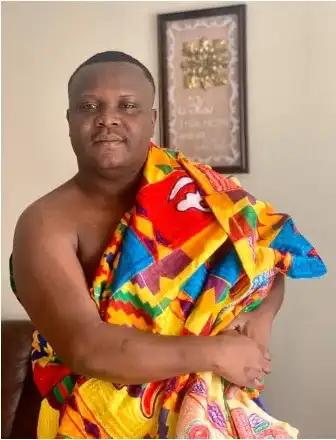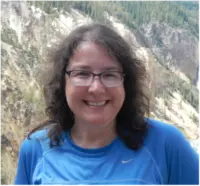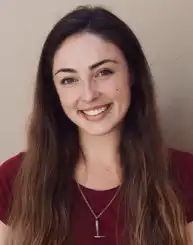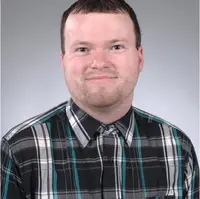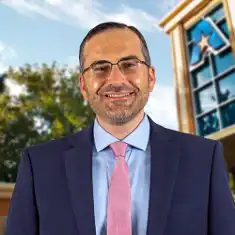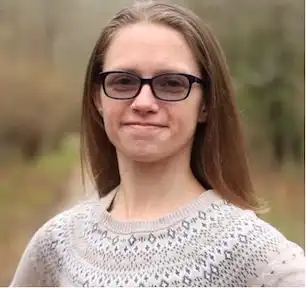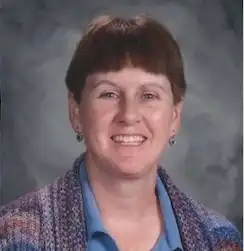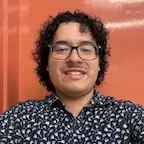Congratulations to the 2025 NAGT Award Winners!
published Sep 29, 2025 8:34amNAGT awards provide our community with the opportunity to recognize colleagues and students in a tangible way that communicates respect for their outstanding efforts and lets them know that their work contributes to our mission. The awards also create an opportunity for networking and building stronger relationships within the geoscience community.
NAGT Award winners and their incredible achievements were celebrated at the NAGT, GSA GER, & GeoCUR Virtual Joint Awards Ceremony on September 26, 2025. Below, you can learn more about this year's awardees.
NAGT Association Awards
Association awards are presented annually with nominations solicited from the community and awardees selected by committees. Learn more by going to the page describing NAGT awards.
Christman Award – Steve Lindberg
Steve Lindberg is a geologist and geoscience educator who maintains a strong commitment to bringing geoscience education to both students and others. He considers the geosciences an extremely valid part of scientific literacy and educating citizens about the importance of understanding earth systems, natural processes, and the impact they have on our daily lives.
Steve has been teaching geoscience courses since 1978, in public education and as an adjunct instructor in the Department of Geosciences and the Environment at the University of Pittsburgh at Johnstown, Pennsylvania. After retiring from public education, he increased his course load at Pitt-Johnstown and spent more time pursuing his interests in geology, especially invertebrate paleontology and the regional geology of western Pennsylvania. His courses at Pitt-Johnstown have included Physical Geology, Astronomy, Meteorology, Earthquakes and Volcanoes, Prehistoric Life, and Geologic Field Methods.
Steve has been a member of the National Association of Geoscience Teachers since 1992; the same year he was awarded the Eastern Section's Outstanding Earth Science Teacher for Pennsylvania. He is the current President of the Eastern Section, a position he's held four times. He has hosted multiple Eastern Section meetings at Pitt-Johnstown, Berkeley Springs, West Virginia, and, most recently, in Ithaca, New York, where he served as the field trip leader for the three-day conference. Steve is also a member of the Geological Society of America and regularly attends the Northeastern Section meetings. Steve was a field trip leader and speaker at the Field Conference of Pennsylvania Geologists, hosted and assisted in organizing the Pennsylvania chapter of the Friends of Mineralogy, and routinely arranges field trips for Pennsylvania rock and mineral clubs to educational sites, such as the New Paris Limestone Quarry in Bedford County, Pennsylvania.
Some of his more recent geologic excursions include assisting on the Pitt-Johnstown Geology Club spring break field trips to Iceland (2016), Scotland (2018), Hawaii (2022), and Portugal (2024). He makes geoscience presentations to school students and other groups, and is an instructor for OLLI, The Osher Lifelong Learning Institute administered through the University of Pittsburgh main campus in Pittsburgh, and has taught a wide variety of online courses in the geosciences for the OLLI adult learning network.
JEDI Award – Samuel Cornelius Nyarko
Dr. Samuel Cornelius "Sammy" Nyarko is an assistant professor in the Department of Earth and Environmental Sciences at Indiana University Indianapolis, and principal investigator of the Earth Sciences Education Research Lab. He has a strong track record in advancing diversity, equity, inclusion, and justice (DEIJ) in geoscience education.
Dr. Nyarko served as chair of the National Association of Geoscience Teachers (NAGT) DEI Committee and as a member on the American Geosciences Institute's (AGI) Inter-Society DEI Committee. Dr. Nyarko's research centers on promoting inclusive departmental and classroom practices to foster a sense of belonging and confidence among underrecognized people.
He has co-developed and applied the Integrated, Coordinated, Open, and Networked (ICON) framework to cultivate DEIJ across the geoscience community, emphasizing global inclusion and critical reflection on the field's historical context. Additionally, he investigates how the history and philosophy of science can be used to teach the nature of science, ethics, and equity in introductory geoscience courses. In recognition of his contributions, Dr. Nyarko received the NAGT-GER Early Career Award in 2024, honoring his emerging leadership in geoscience education research. He was also named Outstanding Reviewer for the Journal of Geoscience Education in 2022.
Miner Award – Laura Guertin
Dr. Laura Guertin is a Distinguished Professor of Earth Sciences at Penn State Brandywine, a campus with a primarily two-year feeder mission located outside of Philadelphia, Pennsylvania. She holds a B.A. in Geology from Bucknell University and a Ph.D. in Marine Geology & Geophysics from the University of Miami's Rosenstiel School of Marine & Atmospheric Science.
At Penn State Brandywine since 2001, she has taught 18 different introductory-level general education courses for non-science majors in Earth science, geoscience, and geography. She has received grant funding from the EPA and the National Science Foundation for projects relating to geoscience education and outreach. Her research has focused on utilizing new and emerging technologies and pedagogical approaches to improve the scientific, information, and geospatial literacies of non-STEM students.
For ten years, she was the blogger on geoscience education and educational technology with the American Geophysical Union (GeoEd Trek). Guertin is also passionate about education and outreach outside of her classroom, connecting with non-STEM audiences through science communication events in-person and online. Since 2018, she has been generating quilts as tools for science storytelling, generating thematic collections on the Louisiana coast and her time at sea on JOIDES Resolution. She is a Fellow of the Geological Society of America and the American Association for the Advancement of Science.
Shea Award – Rachel Phillips
Dr. Rachel Phillips is an NSF STEM Education Postdoctoral Fellow at the University of South Carolina, and online science communicator as @GeoGirl on YouTube. She received her Ph.D. in Geological Sciences from the University of Texas at El Paso, where she conducted lab-based research to improve reconstructions of Earth's ancient climate by strengthening the reliability and precision of palaeoceanographic proxies.
Her postdoctoral research aims to identify misperceptions of geoscience that deter student enrollment. With insights from this research, Dr. Phillips works to transform such misperceptions and promote global inclusivity and engagement in geoscience through her YouTube channel, @GeoGirl. Having posted over 330 videos with over 5.5 million views from around the globe, she has made significant progress toward improving the accessibility and perceptions of geoscience. Now, as a Science Communication Fellow for the Geological Society of America, Dr. Phillips collaborates with other members of the geoscience community to promote the diversity of research, careers, and scientists in the field to her global audience.
Geoscience Education Research (GER) Division Awards
The Geoscience Education Research Division (GER) offers awards that recognize individuals at different stages in their careers. This year, the Early Career Award went to Larry Collins and the Transformation Award went to Cory Forbes.
GER Early Career – Larry Collins
Dr. Larry Collins is a geoscience education researcher and Assistant Professor of Earth/Environmental Science at Longwood University where he also serves as Director of the Environmental Education Center. Previously, Dr. Collins was an Assistant Professor at Delta State University in Cleveland, MS. He completed his PhD at Washington State University, M.S. at Mississippi State University, and B.S.E. at Mansfield University of PA.
Dr. Collins has published several papers and co-authored numerous conference presentations that have focused on several areas of GER, including the nature of science, climate change education research, course-based undergraduate research experiences, and paleontological art. At his home institution, Dr. Collins mentors a research group of students who study socio-scientific issues such as climate change. He has also served numerous roles in professional organizations such as the NAGT-GER (where he is elected as incoming President) Division, the Geological Society of America, and the Geosciences Division of CUR.
GER Transformation Award – Cory Forbes
Dr. Cory Forbes is Associate Dean for Research, Fenton Wayne Robnett Endowed Professor, and Director of the STEM Education Research Collaboratorium and Resource Center in the College of Education at the University of Texas at Arlington. Forbes holds a B.S. in Ecology and Evolutionary Biology, an M.S. in Science Education from the University of Kansas, an M.S. in Natural Resources, and a Ph.D. in Science Education from the University of Michigan.
Dr. Forbes' research focuses on geoscience education in K-12 and undergraduate STEM contexts. He has secured over $9.5M in external funding, authored over 80 peer-reviewed articles and 200 research presentations at national and international conferences, and engaged in GER capacity-building through his mentorship of doctoral students and postdoctoral researchers, past service on the GER Executive Board, and as founding director of the National Collaborative for Research on Food, Energy, and Water Education (NC-FEW).
He currently directs multiple externally funded projects involving postsecondary curriculum development, assessment design and testing, faculty development, and research on STEM teaching and learning that are based in regional, national, and international partnerships. Forbes is a NARST Early Career Research Awardee and a Fulbright Faculty Scholar.
Journal of Geoscience Education (JGE) Awards
JGE awards are presented annually with nominations solicited from JGE readers, authors, and editors.
JGE Outstanding Paper - Katherine Ryker, Laura Lukes, Annie Klyce, Kim Cheek, Nicole D. LaDue, and Peggy McNeal
The geoscience education research (GER) community of practice: a brief history and implications from a needs assessment survey (2024) uses Wenger et al.'s Community of Practice model to analyze the growth and evolution of the geoscience education research (GER) community. The authors conducted a survey assessing the needs of geology and atmospheric science professionals. The survey revealed the need for intentional outreach to international venues, K-12 teachers, and underrepresented groups; identified SERC and the Journal of Geoscience Education as key knowledge resources; and highlighted a strong demand for professional development opportunities. Based on these findings, the authors propose recommendations to enhance inclusivity, mentorship, and dissemination efforts, thereby fostering a more vibrant and diverse GER community.
JGE Outstanding Reviewer – Lindsay C. Mossa
Lindsay Mossa is an Education Specialist at the American Geosciences Institute, where she develops instructional materials and professional development opportunities across all areas of geoscience for educators in K–12 schools and informal settings. She also conducts lesson pilots to collect data on teaching strategies and to help teachers implement effective geoscience instruction. Previously, she taught high school Life, Physical, and Earth Science courses for 15 years in schools in Maryland and upstate New York.
Outstanding Earth Science Teacher Awards
Earlier this year, articles in In The Trenches featured the NAGT 2025 OEST Section Award Winners and 2025 OEST State Award Winners. The OEST Awards recognize Outstanding Earth Science Teachers who inspire students in the Earth sciences.
Dorothy Stout Professional Development Grants
These grants (named in honor of NAGT's first female president, Dorothy "Dottie" Stout) are awarded to faculty and students at two-year colleges and K-12 teachers in support of: participation in Earth science classes or workshops; attendance at professional scientific or science education meetings; participation in Earth science field trips; or purchase of Earth science materials for classroom use.
Jodie Harnden
Jodie Harnden is a retired middle-level teacher, completing 40 years in Pendleton, Oregon. During this time, she also taught geology courses for a local community college. A unique need for a geology teacher is at the local correctional facility, which has been part of her teaching assignment for many years. A recent change in college sponsorship meant a new curriculum, but a continuation of instruction for students. While there are some disadvantages in this setting, there are also some advantages, such as no phones! Jodie plans to continue working this gig part-time, along with staying active in the PNW NAGT division.
Jorge Villela
Jorge is a general education teacher at Rosewood STEM Magnet Urban Planning and Urban Design Elementary School in Los Angeles, California. He is passionate about hands-on learning and using project-based learning to enhance student engagement in class. He believes in creating real-world examples for projects and assignments for student development. Jorge plans to use the funds so that students will create their own cities that can withstand a natural disaster using concepts from urban planning and urban design. His students will use their knowledge of geoscience and their creativity and research to come up with sustainable cities that can survive a natural disaster.
Comment? Start the discussion about Congratulations to the 2025 NAGT Award Winners!


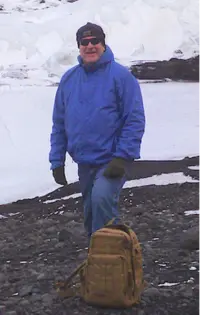
![[creative commons]](/images/creativecommons_16.png)
